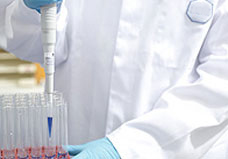| |
 |
|
|
|
|
|
|
Prostate cancer |
|
|
Prostate cancer is a
disease in which malignant (cancer) cells form in the tissues of
the prostate.
The prostate is a gland in the male reproductive system located
just below the bladder (the organ that collects and empties urine)
and in front of the rectum (the lower part of the intestine). It
is about the size of a walnut and surrounds part of the urethra
(the tube that empties urine from the bladder). The prostate gland
produces fluid that makes up part of the semen. Prostate cancer is
found mainly in older men. As men age, the prostate may get bigger
and block the urethra or bladder. This may cause difficulty in
urination or can interfere with sexual function.
The condition is called benign prostatic hyperplasia (BPH), and
although it is not cancer, surgery may be needed to correct it.
The symptoms of benign prostatic hyperplasia or of other problems
in the prostate may be similar to symptoms of prostate cancer.
Possible signs of prostate cancer include
a weak flow of urine or frequent urination.
These and other symptoms may be caused by prostate cancer. Other
conditions may cause the same symptoms. A doctor should be
consulted if any of the following problems occur:
- Weak or interrupted flow of urine.
- Frequent urination (especially at night).
- Trouble urinating.
- Pain or burning during urination.
- Blood in the urine or semen.
- A pain in the back, hips, or pelvis that
doesn't go away.
- Painful ejaculation.
Tests
that examine the prostate and blood are used to detect (find) and
diagnose prostate cancer.
The following tests and procedures may be used:
-
Digital rectal exam (DRE): An
exam of the rectum. The doctor or nurse inserts a lubricated,
gloved finger into the rectum and feels the prostate through the
rectal wall for lumps or abnormal areas.
-
Prostate-specific antigen (PSA)
test: A test that measures the level of PSA in the blood. PSA is
a substance made by the prostate that may be found in an
increased amount in the blood of men who have prostate cancer.
PSA levels may also be high in men who have an infection or
inflammation of the prostate or BPH (an enlarged, but
noncancerous, prostate).
-
Transrectal ultrasound: A
procedure in which a probe that is about the size of a finger is
inserted into the rectum to check the prostate. The probe is
used to bounce high-energy sound waves (ultrasound) off internal
tissues or organs and make echoes. The echoes form a picture of
body tissues called a sonogram. Transrectal ultrasound may be
used during a biopsy procedure.
-
Biopsy: The removal of cells
or tissues so they can be viewed under a microscope by a
pathologist. The pathologist will examine the biopsy sample to
check for cancer cells and determine the Gleason score. The
Gleason score ranges from 2-10 and describes how likely it is
that a tumor will spread. The lower the number, the less likely
the tumor is to spread. There are 2 types of biopsy procedures
used to diagnose prostate cancer
-
Transrectal biopsy: The
removal of tissue from the prostate by inserting a thin needle
through the rectum and into the prostate. This procedure is
usually done using transrectal ultrasound to help guide the
needle. A pathologist views the tissue under a microscope to
look for cancer cells.
:
Certain factors affect
prognosis (chance of recovery) and treatment options.
The prognosis (chance of recovery) and treatment options depend on
the following:
- The stage of the cancer (whether it affects
part of the prostate, involves the whole
- prostate, or has spread to other places in
the body).
- The patient’s age and health.
- Whether the cancer has just been diagnosed or
has recurred
|
|
|
|
Prostate cancer - treatment of Prostate cancer,
Prostate cancer types, Disease medicines, Prostate cancer symptoms, Prostate
cancer and Disease symptoms, Prostate cancer symptoms Disease and diagnosis,
Symptoms and Solutions, Signs and Symptoms, type of Prostate cancer, cause
common, common Prostate cancer, Prostate cancer List, causes list,
Infectious Prostate cancer, Causes, Diseases , Types, Prevention, Treatment
and Facts, Prostate cancer information, Prostate cancer: Definition,
Prostate cancer names, medical Prostate cancer, medical Prostate cancer and
disorders, cell Prostate cancer, Prostate cancer Worldwide, Prostate cancer
Research, Prostate cancer Control, Prostate cancer Center, Digestive
Prostate cancer Week, Information about Prostate cancer, causes of different
Prostate cancer, Prostate cancer Articles, Prostate cancer and conditions,
Health and Prostate cancer, Prostate cancer Patients, Prostate cancer and
Sciences, causes of alzheimer's Prostate cancer, Prostate cancer causes,
alternative medicine heart Prostate cancer, body ailments, Prostate cancer
medicines, medical antiques, type of blood Prostate cancer |
|
|





